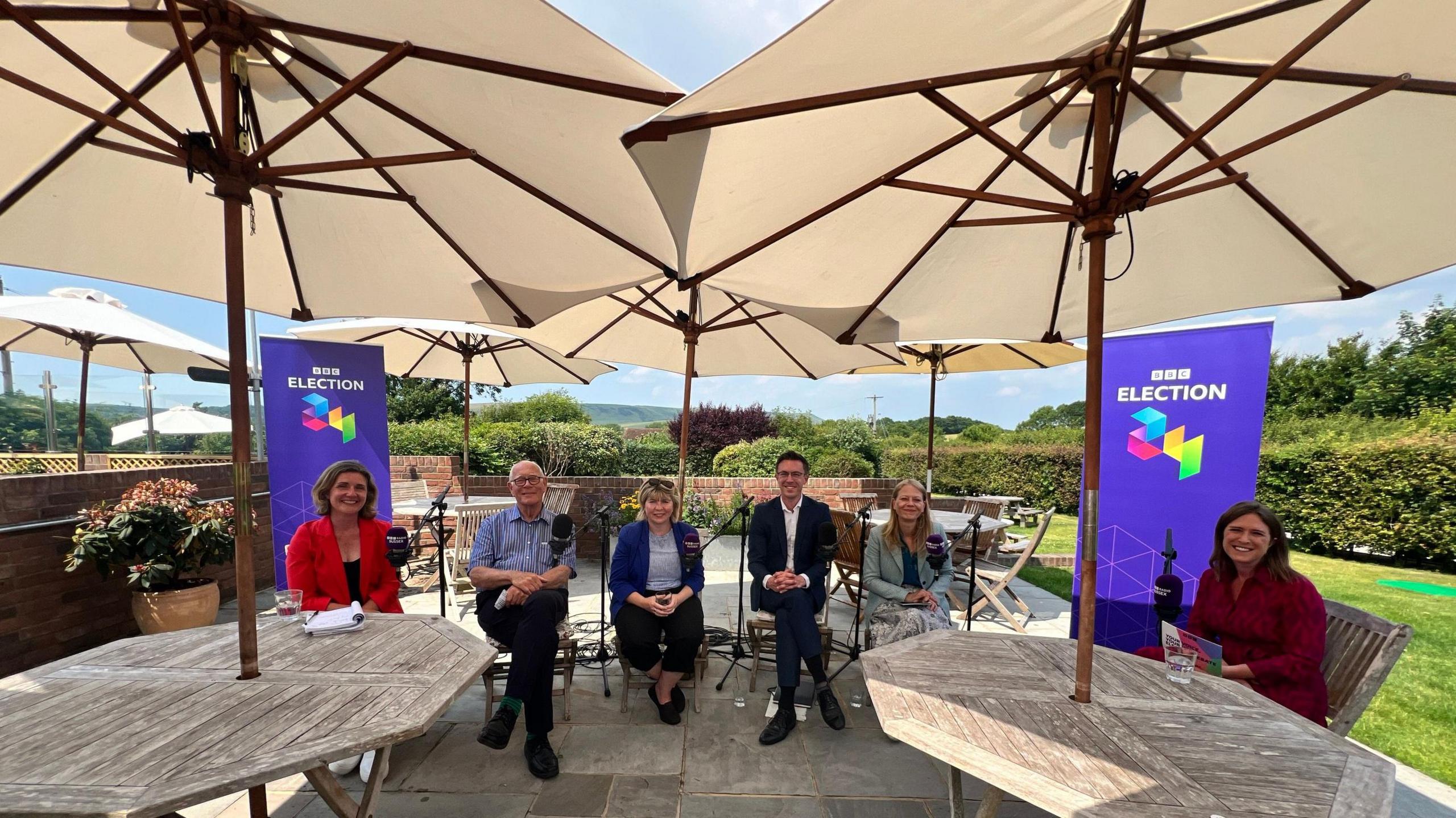Seven takeaways from BBC Sussex's election debate

The candidates answered questions in the garden of the Sussex Ox pub
- Published
With a week to go until polling day, we took our Sussex political candidates to the pub.
Local pubs are where politics is debated every day of the year, even if some people might not even realise they’re doing it.
Candidates from the five main political parties joined us at the Sussex Ox in Polegate, overlooking the South Downs, to answer questions sent to us for Your Voice, Your Vote.
So what did we learn? Here are seven takeaways from the debate, which you can watch on iPlayer here.
1. NHS management needs an overhaul
Does the NHS need more money – or just better management?
Dr Beccy Cooper said Labour would create 40,000 new appointments and a National Care Service to “get the NHS off life support”.
She said: “If you look at where the funding is at the moment, it's primarily in hospitals, so once we’ve got those waiting times down we need to start looking at primary care and community care.”
Reform UK’s Bernard Brown said it was about a “philosophy of management”. He said the NHS is treated “as a deity that can’t be touched” but administrative systems need to be more effective so people get the care they want in a timely way.
Conservative Maria Caulfield said the NHS was “playing catch-up” after the pandemic.
She added: “£190bn a year is going into the NHS, it's not because of lack of funds. We’re trying to put that money into frontline services so if you look across Sussex now we’ve got Rapid Diagnostic Centres opening where people can get their CTs, MRI, X-rays without going in to hospital.”
Sian Berry from the Green Party said: “We’ve seen too much privatisation within the NHS, people know that it’s less efficient to have their appointments farmed out to the private sector who are making profits out of it.”
Liberal Democrat Ben Dempsey said creating more GPs would “focus on the front door of the NHS”.
He said: “If you can’t get a GP appointment you end up popping up somewhere else in the system, you have to go to A&E or another care provider. It’s incredibly expensive and inefficient to do that.”
2. More housing
Our panel generally agreed that developer-led housebuilding was leading to “the wrong kinds of houses in the wrong kinds of places” as Ben Dempsey put it.
But they were divided on whether councils currently have enough power over developers.
The Liberal Democrats want to provide more power to local councils to buy land to build more social housing and have more control over infrastructure alongside developments.
Labour proposes a National Policy Planning Framework, including restoring mandatory housing targets, to get “the right housing mix” as Beccy Cooper said.
Green candidate Sian Berry said her party would invest heavily in building more council homes and give councils more power to control the level of rent.
Conservative Maria Caulfield said she was “frustrated” the panel didn’t acknowledge their Neighbourhood Plan policy, where communities can be consulted and hold referendums to identify sites for building and have control over the type of housing.
Reform UK said increasing the population through immigration was creating a supply and demand problem in housing that other parties were ignoring while welcoming people in.
3. Solving social care is complicated
The Conservatives plan to introduce a cap of £85,000 on what a person spends on their social care and raise the threshold of owned assets from £23,250 to £100,000 for people to have their care cost supported.
Labour said they would honour those plans – and look at creating a National Care Service to solve the “complicated” challenge of social care and the need for parity with the NHS.
The Lib Dems want to provide free social care by taxing banks and social media companies, improve pay and conditions for care workers and launch a National Commission on care. Labour and Greens have also talked about fairer pay for care workers.
Reform UK said a close working relationship in East Sussex between the NHS and social care services has worked for the past few years.
The Green Party also want to offer free social care and said they and the Lib Dems were “the only ones who’ve found any money at all” for social care in their manifestos.
4. How can ageing water infrastructure be updated?
Everyone agreed the record levels of illegal sewage dumping in Sussex’s rivers and seas is “shameful”.
Since 2019 Conservatives said they have made sure almost all outflows are now monitored and they have a £56bn plan to decouple sewage from rainfall, due to start this autumn, which involves digging up roads across the country.
The Greens say investment has been lacking and privatisation has failed. They want to renationalise water companies.
Reform UK infrastructure repairs are taking place, but too many companies are owned by foreign equity firms.
Labour say the water companies are in too much debt to be renationalised, as the tax payer would take on that debt burden.
Instead of renationalisation, the Liberal Democrats favour changing the legal status of water companies to public benefit companies, similar to the USA model.
All candidates supported new legislation which will enable Ofwat to prosecute water companies for illegal dumping of sewage.
5. Investment in public services is a taxing question
Reform UK would lift the tax-free income threshold to £20,000.
Conservatives say getting inflation down has allowed them to cut taxes and money can be saved in public services with greater efficiency.
Labour’s manifesto pledges not to put up taxes for working people and therefore said they must be “mindful” of how to spend the money they have.
The Greens favour investment in public services over austerity and say taxing the super-rich is a missed opportunity.
Liberal Democrats say increases in capital gains tax and taxing large corporations would boost public services.
6. 'When Labour are in Government'
It was striking how often some of the candidates made reference to “when Labour are in Government”.
Although the political opinion polls have Labour in the lead, no-one can predict what the outcome of this election will be.
Even the Conservative candidate said one of their planned policies “would still come into effect unless Labour change that”.
Only Reform UK made no reference to the leadership of the next Government.
7. Other parties and independents are available
The BBC Sussex Your Voice, Your Vote debate included the five biggest parties who are likely to receive the most support at the general election, but there are others to choose from.
Many of the 17 constituencies in Sussex will have other names on the ballot paper too.
The Social Democratic Party is standing in six areas and the Heritage Party has three candidates.
There are also candidates from a number of smaller parties, as well as a dozen independents.
A full list of candidates standing in the general election is available here.
Follow BBC Sussex on Facebook, external, on X, external, and on Instagram, external. Send your story ideas to southeasttoday@bbc.co.uk, external or WhatsApp us on 08081 002250.

Get in touch
Your Voice, Your Vote: What do you want BBC News to cover this election?
